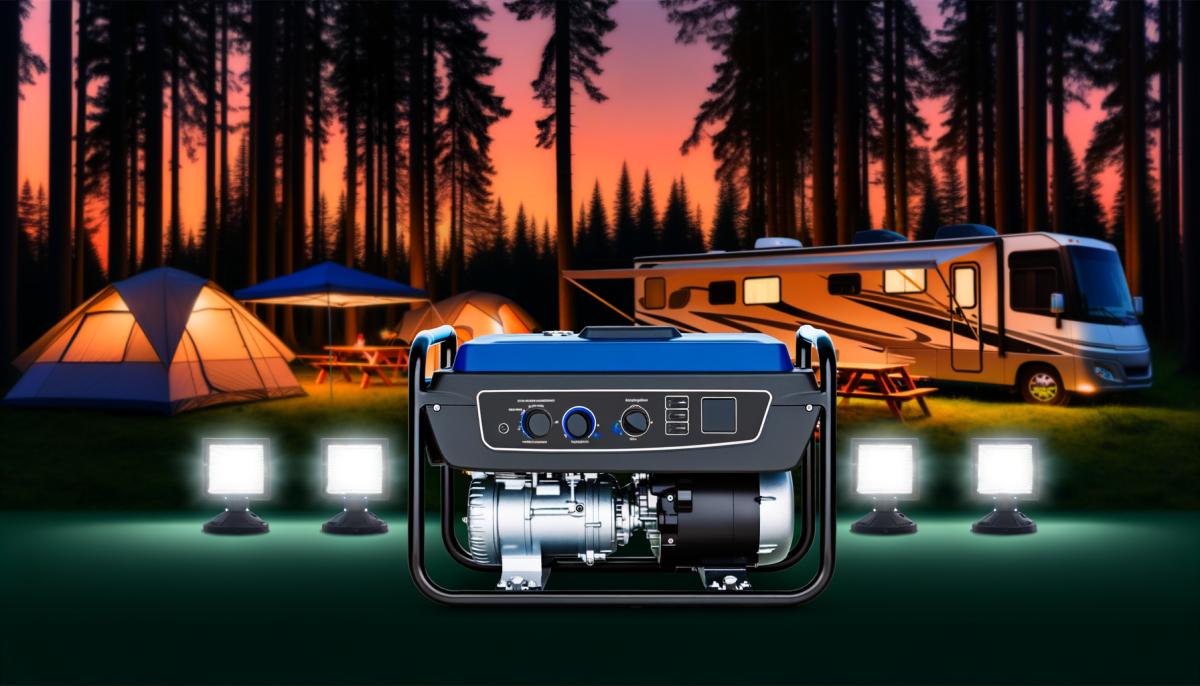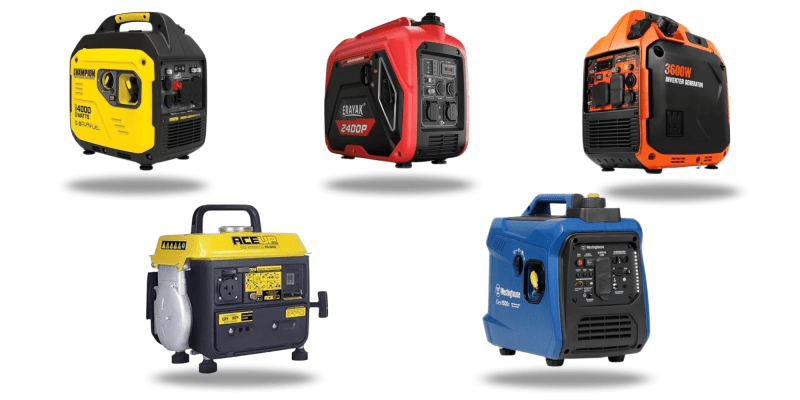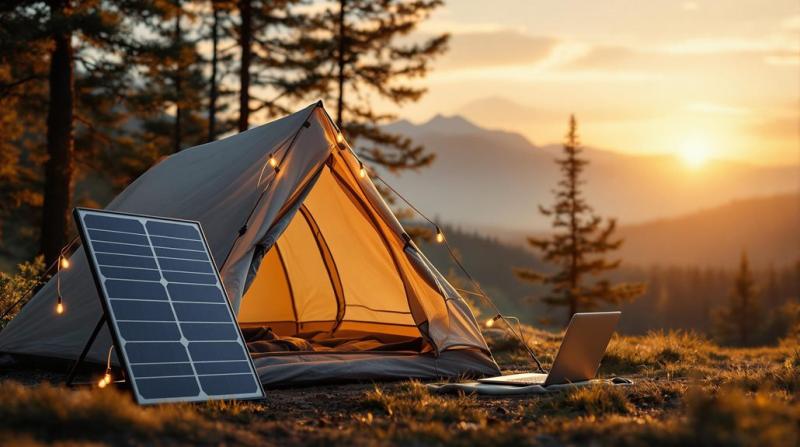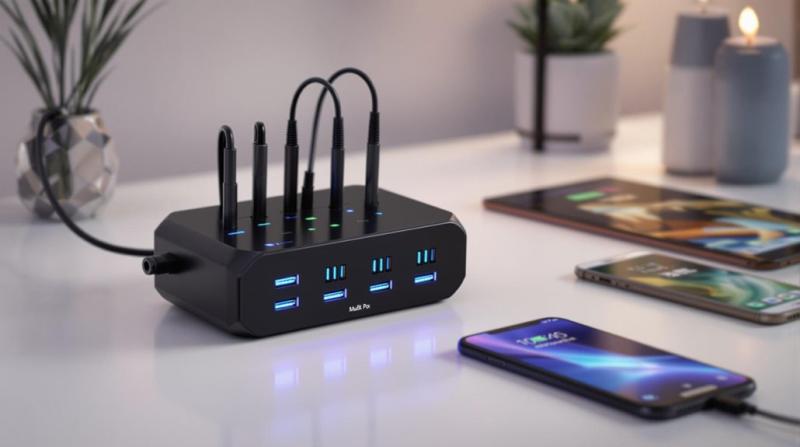When you're on the hunt for the best high-capacity portable generators, you might want to check out models like the Honda EU7000iS, DuroMax XP12000EH, and Generac GP8000E. Seriously, each of these has something special going for it.
Take the Honda, for example. It's super quiet and fuel-efficient. That makes it perfect if you need to power sensitive electronics without all that noise.
Then there's the DuroMax. This one offers dual-fuel capability, which is a lifesaver in emergencies. Trust me, having options is always a good thing.
Oh, and don't forget about the Generac. It comes with an electric start and has robust wheels, so moving it around is a breeze.
So, what should you keep an eye on? Think about power output, the type of fuel it uses, how noisy it is, and how portable it is. Understanding these factors will totally help you make the best choice for your needs.
Top High-Capacity Generators
When you're picking out a high-capacity generator, there are a few key things you'll want to look at. Wattage output, fuel type, and how easy it's to move around are all crucial. This ensures the generator meets your specific power needs. These big generators are made to give you a lot of energy, whether you need it for home backup during a power outage or for powering tools on a job site.
One of the top picks out there is the Honda EU7000iS. This is an inverter generator that can put out a max of 7,000 watts and runs on gasoline. What's cool about it is that it provides clean power, which is great for sensitive electronics. Plus, it's pretty quiet and fuel-efficient, making it awesome for using at home.
Another solid choice is the DuroMax XP12000EH. This one's a dual-fuel generator, so it can run on either gasoline or propane. With a peak output of 12,000 watts, it can handle some serious power needs. This makes it perfect for camping or emergency situations. It's also got a rugged design, which is a big plus if you're using it outdoors.
If you need something even more powerful, check out the Generac GP8000E. This generator gives you 8,000 watts and comes with an electric start, making it super convenient to use. It also has heavy-duty wheels, which makes it easier to move around when you need to.
In the end, the best high-capacity generator for you really depends on what you need it for, what kind of fuel you prefer, and how you plan to use it. Once you figure out those details, you'll be able to find a reliable generator that's just right for you.
Key Features to Consider
Understanding the key features of high-capacity generators can really help you make a smart choice and ensure you pick a model that fits your power needs and how you plan to use it.
First off, think about the generator's power output, usually measured in watts. You'll want to make sure the generator can handle your maximum load, including any extra power needed for appliances that have a surge demand when they start up.
Next up, consider the fuel type. Most generators run on gasoline, propane, or diesel, and each option has its pros and cons. Gasoline models are generally lighter and easier to find, while propane tends to be cleaner and has a longer shelf life. Diesel generators often offer greater durability and fuel efficiency, but they can be heavier and noisier.
Portability is another key feature. Look for generators with wheels and comfortable handles, especially if you'll be moving it around a lot. Some models also come with foldable designs or compact shapes, which makes them easier to store.
Don't forget about the noise level. Many high-capacity generators list their decibel levels, and you might want to go for one that operates quietly, especially if you're using it at home or while camping.
Finally, pay attention to safety features. Things like automatic shut-off, circuit breakers, and ground fault circuit interrupters can help prevent accidents and protect your equipment.
Battery Capacity Explained
Battery capacity in portable generators refers to the total amount of electrical energy stored in a battery. It's usually measured in watt-hours (Wh) or amp-hours (Ah), and it directly influences how long the generator can power your devices before needing a recharge. So, understanding battery capacity is essential for picking a generator that meets your energy needs.
When you're looking at battery capacity, think about the power requirements of the devices you plan to use. For example, if you want to run a refrigerator that consumes 200 watts, a generator with a capacity of 1,000 Wh can run it for about five hours (1,000 Wh ÷ 200 W = 5 hours). But remember, the actual runtime can vary based on factors like battery age, discharge rates, and environmental conditions.
Another thing to consider is the efficiency of the inverter used in the generator. Inverters convert stored DC power to AC power, and inefficiencies can lead to a shorter runtime than you might expect. So, when you're checking out battery capacity, look for generators with high-quality inverters that minimize energy loss.
Also, think about the type of battery technology used. Lithium-ion batteries usually offer higher energy density and longer lifespan compared to lead-acid batteries, making them a better option for high-capacity needs.
Ultimately, knowing the battery capacity helps you choose a portable generator that fits your power demands, ensuring you won't run out of energy when you need it most.
Performance Comparisons
Evaluating the performance of high-capacity portable generators is all about comparing their efficiency, runtime, and output under different loads. This helps you figure out which models best meet your specific energy needs.
First off, let's talk efficiency. Efficiency ratings tell you how many watts a generator produces per gallon of fuel consumed. Generators with higher efficiency ratings are going to save you money on fuel, especially if you need them for long stretches.
Next up is runtime. This is all about how long a generator can run on a full tank, depending on the load. You want models that offer long runtimes at both half and full loads. This is really handy during power outages or when you need a constant energy supply for tools and appliances.
Output is another biggie. You need to look at both the starting and running wattage capabilities. Starting wattage is the power you need to kickstart appliances, while running wattage is what you need to keep them running. If you're planning to run multiple devices at the same time, make sure your generator can handle the total wattage.
Also, check how each generator performs under different load conditions. Some might struggle with surge loads, while others stay stable. By looking at these performance metrics, you can make a smart choice about which high-capacity portable generator is right for you. This way, you'll have reliable power when you need it most.
User Reviews and Ratings
When you're checking out high-capacity portable generators, user reviews and ratings can really give you the lowdown on how they perform and how reliable they are.
You'll see that a lot of folks point out the standout features that make some models shine in real-world situations.
Performance Ratings Overview
User reviews and ratings? They're like gold mines for anyone on the hunt for high-capacity portable generators. These insights really help potential buyers make smart choices. When you dive into user feedback, you'll notice some common threads. People often talk about power output, fuel efficiency, and how easy the generator is to use.
One thing that pops up a lot is the wattage capacity of the generator. This is super important because it tells you how many devices you can power at the same time.
Now, let's talk fuel efficiency. Reviews usually get into how long a generator can run on just one tank of fuel. This is a big deal, especially if you need it for emergencies or outdoor adventures.
And noise levels? Oh, people definitely have opinions on that. Quieter models get a lot of love, especially if you're planning to use them in residential areas.
Reliability is a huge deal too. Generators that fire up without a hitch and keep running smoothly under load tend to score higher in ratings.
And don't forget about maintenance. Some models need a lot more TLC than others, and user reviews will definitely clue you in on that.
Key Features Highlighted
Many reviews really make a big deal about key features like portability, runtime, and ease of setup when it comes to high-capacity portable generators. These aspects can really make or break user satisfaction.
Let's start with portability. People love it when generators are lightweight and come with wheels or handles. It just makes moving them around so much easier, especially if you're in an emergency situation or out enjoying some outdoor activities. It's a big plus if the generator can easily fit into a vehicle or be moved around a job site without any hassle.
Runtime is another biggie. Generators that have longer fuel efficiency are a huge hit because they allow for extended use without needing to refuel all the time. This is super important during power outages or long camping trips. Folks often compare fuel types, and many note that propane generators might offer longer runtimes than their gasoline counterparts.
And then there's ease of setup. This gets a lot of attention too. People really appreciate generators that come with simple instructions, quick-start features, and minimal assembly. An intuitive design can save so much time and reduce frustration, especially if you're not familiar with operating this kind of equipment.
User Experiences Shared
Reviews consistently highlight how satisfied customers are with the performance and reliability of high-capacity portable generators. This is especially true during critical situations like power outages or outdoor events.
Many users commend the ease of setup and operation. They often note that they appreciate intuitive controls and clear instructions. This user-friendliness can be a significant advantage when time is of the essence.
And here's something everyone seems to love: fuel efficiency. These generators allow them to run longer without frequent refueling. This is especially valuable during extended outages or outdoor activities where access to fuel might be limited.
Plus, noise levels come up a lot in conversations. Many users report that quieter models create less disruption, making them suitable for camping or neighborhood use.
Reliability is another key factor. Numerous reviews emphasize how these generators performed consistently under demanding conditions, providing peace of mind.
However, it's not all sunshine and roses. Some users have experienced issues with weight and portability, finding it challenging to transport heavier units.
Maintenance Tips for Longevity
If you want your high-capacity portable generator to last a long time, taking care of it regularly is super important.
So, here's the deal: you need to change the oil on time, keep those air filters clean, and make sure the battery is in good shape.
Regular Oil Changes
Regular oil changes are key for keeping your high-capacity portable generator performing well and lasting a long time. They stop sludge from building up and ensure everything inside is properly lubricated.
You see, over time, engine oil breaks down because of heat, contaminants, and oxidation. This makes it less effective. Sticking to a regular oil change schedule keeps all the internal parts of your generator well-oiled, cutting down on friction and wear.
So, how often should you change the oil? Well, your best bet is to check your generator's manual since different models have different needs. But as a general rule, every 50 to 100 hours of operation is a good range to follow.
When you do change the oil, make sure to use the type specified by the manufacturer. It's specially made to work best under the conditions your generator operates in.
Also, it's a good idea to check the oil level before each use. If the oil looks dark or gritty, go ahead and change it, even if you haven't hit that 50 to 100-hour mark yet.
And don't forget to dispose of the old oil properly to keep our environment safe. By making regular oil changes a priority, you'll not only boost your generator's efficiency but also make it last a lot longer. That way, you can count on it to work reliably whenever you need it.
Clean Air Filters
Keeping your air filters clean is super important for making sure your high-capacity portable generator runs smoothly and lasts a long time. When air filters get dirty or clogged, they mess with the airflow, which leads to bad combustion and less power. So, to keep your generator in top shape, make it a habit to check and clean the air filters regularly.
First things first, grab your generator's manual and look up the section on filter maintenance. This will give you specific advice, including how often to clean the filters. Generally, you should take a look at the air filter every 25 to 50 hours of use. If you're in a dusty place, you might need to check it even more often.
When it's time to clean, a blast of compressed air or a gentle brush should do the trick to get rid of dirt and debris. If the filter looks really worn out or damaged, go ahead and replace it.
Here's a tip: if you often use your generator in tough conditions, think about adding pre-filters or external covers to keep dirt from piling up too fast. This little step can help your main air filter last longer.
And don't forget, after cleaning or swapping out the filter, make sure it's seated properly. You don't want unfiltered air getting into the engine.
Battery Maintenance Practices
Keeping your air filters clean is super important for your generator's performance, but you can't forget about proper battery maintenance if you want long-term reliability and efficiency.
So, let's start with checking those battery terminals for any signs of corrosion. A simple solution of baking soda and water can do wonders to ensure a solid connection.
Also, you've gotta keep the battery charged. If you let it discharge completely, you're looking at a much shorter lifespan. So, make it a habit to recharge it regularly, especially if you're storing it for a while. A smart charger is a great investment because it automatically adjusts the charge level based on the battery's state.
Temperature is a big deal too. Extreme heat or cold can mess with your battery's performance. If you can, store your generator in a climate-controlled spot to help out with that.
And hey, if you're using a lead-acid battery, don't forget to check the battery fluid levels. Top them up with distilled water when needed. Make sure the fluid covers the plates but doesn't overflow. Easy peasy, right?



